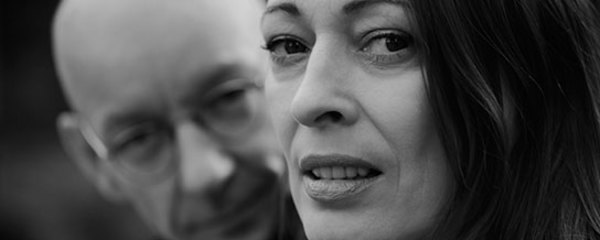Ocean Club: Uncharted Waters
Berlin shot through the electronic music ranks during the first half of the decade, rising […]
Ocean Club: Uncharted Waters
Berlin shot through the electronic music ranks during the first half of the decade, rising […]

Berlin shot through the electronic music ranks during the first half of the decade, rising from vibrant outpost to the scene’s global epicenter. With a tight-knit community of producers and labels, it suddenly seemed like every digitized beat emanated from the once-divided city.
But a moment is never just an isolated moment, and there’s always a backstory explaining how all the right elements coalesced. In Berlin’s case, an important part of this story revolves around the Ocean Club. A collaborative effort of longtime scene stalwarts Gudrun Gut and Thomas Fehlmann, the Ocean Club has–at various times during its 10-year history–encompassed a weekly party, a Friday night radio program, a groundbreaking concert-hall series, and even a state-sponsored record fair. As a result of their far-reaching influence, Gut and Fehlmann have garnered a reputation as not only instigators within Berlin’s scene, but also global ambassadors of the city’s sound.
While Gut and Fehlmann were exposed to one another’s music in the ’80s–via their involvement in fevered post-punk band Malaria and quirky no wave act Palais Schaumburg, respectively–the pair weren’t properly introduced until the mid-’90s. Fehlmann was already an established player, having collaborated with Dr. Alex Patterson as part of The Orb and Juan Atkins as part of Detroit-Berlin super group 3MB. Gut was new to techno; tired of the formal structures imposed by bands, she had abandoned rock in 1994 in favor of experimenting with electronic bass loops. Though she enjoyed the liberties of being a solo artist, Gut missed playing music with other people. Once her crude loops evolved into fully realized tracks, she jumped at the chance to collaborate with friends on what would later become her electronic debut, 1996’s Members of the Ocean Club.
That same year, famed techno club Tresor invited the burgeoning Ocean Club to throw a weekly Sunday night soirée in their downstairs lounge. “We made the room all up in gold and lots of little fish,” Gut recalls fondly. “We started with resident DJ Chica Paula, live sets by Sun Electric, and had a mermaid tending bar!”
Fehlmann is quick to remark that though the vibe was consistently playful and laid back, there was an important idea behind these Sunday socials: “We were coming off the back of the first big Berlin techno wave and we wanted to keep the doors of Tresor open, as they were already becoming a somewhat restrictive symbol.” Ocean Club committed itself to playing music as eclectic as it was forward thinking, challenging Berlin’s notoriously finicky electronic purists by mixing lo-fi, jazz, hip-hop, and Krautrock amongst the techno.
The following year, Berlin radio station Radio Eins approached Gut and Fehlmann to co-produce a Friday night program. A weekly broadcast of mermaids and fortune cookies, poetry, and guest DJ sets by the likes of Ekkehard Ehlers, Robert Lippok, and regular co-conspirator Daniel Meteo, it’s always been dedicated to what Gut refers to as lieblingslieder, or ‘loved songs.’ Ocean Radio continues to broadcast every Friday night between 11 p.m. and 1 a.m. Gut introduces a diverse batch of records handpicked by herself and Fehlmann; traversing time and genre, indie rock cozies up against techno while vintage jazz rubs shoulders with spaced-out dance rock. “I was always interested in the horizontal landscape of music, because I believe that’s where the real developments start,” says Gut.
Ocean Club eventually moved to Berlin’s popular WMF, but the next big step occurred in 2000, when East German populist playhouse Volksbühne asked Gut and Fehlmann to curate a series of concerts to take place on each of its four fabled stages. Ocean Club presented the then-burgeoning Cologne label Kompakt, followed by a Mute night headlined by Thomas Brinkmann and Nick Cave, and hosted Dabrye’s first European gig. “The sheer shock value of it all made us realize that everything was possible,” says Fehlmann of the shows.
“After Volksbühne, we thought it would be nice to see what’s inside our own city,” Gut recalls. “Berlin had so many labels but no clear sound direction like that of Cologne.” From 2001 through 2005, the Ocean Club spun off markeB, a Senate-sponsored record fair showcasing 400 hundred of Berlin’s vital imprints, including Bpitch Control, ~scape, Perlon, and Shitkatapult.
These days, as Berlin pulses with the veritable bass beat of its sprawling scene, the Ocean Club is content to take a back seat. Gut and Fehlmann continue to produce their weekly Ocean Radio show, but the Club doesn’t have a current residency and the future of markeB is uncertain. Fehlmann assures that this is nothing out of the ordinary: “The Ocean Club has always worked as a catalyst in certain crucial moments, then taken a step back.”

